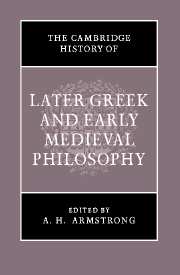Book contents
- Frontmatter
- Chapter 1 Introductory
- Part 1 GREEK PHILOSOPHY FROM PLATO TO PLOTINUS
- Chapter 2 The Old Academy
- Chapter 3 Aristotle
- Chapter 4 The Later Academy and Platonism
- Chapter 5 The Pythagoreans
- Chapter 6 The Peripatos
- Chapter 7 The Stoa
- Part II PHILO AND THE BEGINNINGS OF CHRISTIAN THOUGHT
- Part III PLOTINUS
- Part IV THE LATER NEOPLATONISTS
- Part V MARIUS VICTORINUS AND AUGUSTINE
- Part VI THE GREEK CHRISTIAN PLATONIST TRADITION FROM THE CAPPADOCIANS TO MAXIMUS AND ERIUGENA
- Part VII WESTERN CHRISTIAN THOUGHT FROM BOETHIUS TO ANSELM
- Part VIII EARLY ISLAMIC PHILOSOPHY
- Select Bibliography
- Additional Notes and Bibliography
- Index of ancient and medieval works referred to in the text
- General Index
- Index of Greek terms
- References
Chapter 7 - The Stoa
from Part 1 - GREEK PHILOSOPHY FROM PLATO TO PLOTINUS
Published online by Cambridge University Press: 28 March 2008
- Frontmatter
- Chapter 1 Introductory
- Part 1 GREEK PHILOSOPHY FROM PLATO TO PLOTINUS
- Chapter 2 The Old Academy
- Chapter 3 Aristotle
- Chapter 4 The Later Academy and Platonism
- Chapter 5 The Pythagoreans
- Chapter 6 The Peripatos
- Chapter 7 The Stoa
- Part II PHILO AND THE BEGINNINGS OF CHRISTIAN THOUGHT
- Part III PLOTINUS
- Part IV THE LATER NEOPLATONISTS
- Part V MARIUS VICTORINUS AND AUGUSTINE
- Part VI THE GREEK CHRISTIAN PLATONIST TRADITION FROM THE CAPPADOCIANS TO MAXIMUS AND ERIUGENA
- Part VII WESTERN CHRISTIAN THOUGHT FROM BOETHIUS TO ANSELM
- Part VIII EARLY ISLAMIC PHILOSOPHY
- Select Bibliography
- Additional Notes and Bibliography
- Index of ancient and medieval works referred to in the text
- General Index
- Index of Greek terms
- References
Summary
General
The significance of some doctrines of Posidonius and of Seneca for the development of Neoplatonism has been indicated. But these doctrines concern only details, and the problem remains to what extent Stoicism at large contributed to Neoplatonism.
The Stoic system can be interpreted in two ways. We see in it either a ‘mundanization’ and a materialization of the divine, or, on the contrary, a divinization and spiritualization of matter. Nothing exhibits this ambiguity better than the relation between determinism (heimarmenê) and providence (pronoia) in the Stoic system. Strict determinism seems to leave no place for providence in any genuine sense of the word. But the Stoa tried to identify the two. The same ambiguity is exhibited in one of the central concepts of the Stoa, the spermatic ratio (pattern). The adjective has materialistic connotations, the noun spiritualistic ones. The strict immanentism of the Stoa can be taken to assert either the divine character of the cosmos or the strictly mundane character of the divine.
Like all monistic and deterministic systems which at the same time profess some kind of prescriptive ethics, Stoicism must try to find some place for freedom of the will (mostly, the formula will be accepted that we are free, because we can do whatever we want, but determined, because we must want what we want), some meaningful discrimination between good and evil, some possibility of distinguishing between ‘is’ and ‘ought’. Whether any of this can be done is doubtful..
- Type
- Chapter
- Information
- Publisher: Cambridge University PressPrint publication year: 1967



